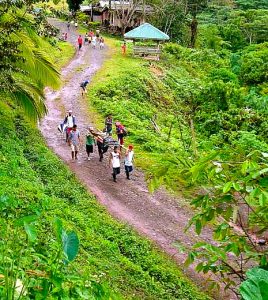
The evening rain beat steadily against the little Banwaon hut. Inside, what should have been a happy occasion was not. Mahi had delivered her baby hours ago and yet, still no placenta.
The weak, incoherent young mother burned with fever. The tribal ladies looked at each other helplessly. They had done everything they knew to do.
“What’s wrong? What’s going on?” the young tribal father asked anxiously, knowing the lack of usual chatter was not a good sign.
“If Mahi doesn’t deliver the placenta, she will die from infection,” one of the older ladies told him. It had happened recently in other villages.
Mahi’s husband felt like all his life had just been knocked out of him. He couldn’t survive without Mahi! And neither could their new little girl.
“Well, what can we do?” he asked, going to Mahi’s bedside and gently touching her damp brow. “How can we help her?”
“She needs to go to the hospital in the city,” the same older lady said.
“Then let’s go!” he almost shouted. They had to remind him it was 51 miles away and the missionary pilot was gone.
“How about a motorbike?” one of the other ladies offered. But rain had left the roads thick, deep pools of mud. Even if they could get through, the hard, jostling ride would kill the weakened mother for sure.
Mahi’s husband sat down beside his wife’s mat and put his head in his hands. The options were narrowing so quickly he felt he was being crushed. What could they do? What do you do when a sick woman needs to get to the hospital and you don’t have a vehicle?
“We can pray,” one lady said softly, as if she had just read his thoughts.
Mahi’s husband raised his head slowly, hope jumping back into his eyes. Yes! He’d forgotten. God was in their village now! They weren’t alone anymore! Yes! They could pray!
Word spread throughout the village, “Pray for Mahi! She needs to get to the hospital!”
You could almost hear the quiet settle over the jungle as the Banwaon believers began to pray.
But by morning, Mahi was still far from the hospital and even closer to death’s door.
Through his weary and worried fog, her husband thought he heard voices and went to the door. In the pouring down rain, believing men from three different villages were gathering outside his hut.
“We’ll help carry your wife,” they volunteered. They held up a homemade stretcher the men and boys had constructed of rice sacks and saplings.
The shocked husband was speechless. The recent deaths in other villages had occurred because no one had been willing to help or intervene.
And not only would the weather complicate the journey, but Banwaons also avoid rain and even bathing, believing that getting wet is bad for your health.
Yet here the sopping men stood – the unexpected answer to their prayers.
Mahi was laid carefully on the rickety stretcher. Three teams of four men each would take turns carrying her 27 miles over muddy, slippery, dangerous trails to a village with a vehicle.
With lots of well-wishing and promises to pray, the first team shouldered the stretcher and the group of 12 men set off at a brisk pace through the wet Philippine jungle.
But 10 grueling hours later when they jogged into the intended village, there were no longer 12 men. There were many more.
Believing men in villages along the way had rushed to take over from the group of drenched, exhausted stretcher-bearers. Complete strangers had lent their shoulders and gave another man a rest.
Now the vehicle took Mahi on to the hospital and she survived.
But it’s the unbelievers along the trail who were left shaking their heads. “What made all these men care so much — and about a woman even?” they wondered.
What indeed. Tribal Beat by Debbie Burgett